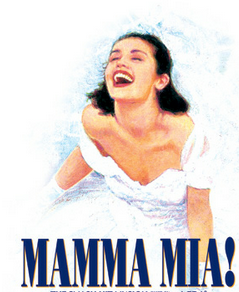
Knowing me, knowing you (Ah-Ha!). There’s not a damn thing we can do. I’ve got this sneaking suspicion that a person is either predisposd to like Mamma Mia or not. Turns out, I’m not but with more than 42-million tickets sold around the globe, a stinging review from Memphis seems almost pointless. And yet I feel compelled to at least send a message to all the people who got up off their butts to give this wooden mess of a show a thunderous standing ovation : You’re not doing yourself, the actors, or anybody else any favors.
Mamma Mia, the Abba jukebox musical, is a weirdly nostalgic situation comedy set on a Greek island where the daughter of an unmarried American ex-pat has planned a big, messy surprise for her wedding party.
Sophie was born in the swinging, free-loving 1970’s, and her mother Donna, a rock-and-roller turned put-upon tavern-owner, has never been sure who the father was. After reading her mom’s diary, however, the determined young woman hones in on the three most likely candidates, an architect, a writer, and a gay banker. Hoping she’ll be able to solve the mystery in time to have her real dad give away the bride Sophie forges letters from her mother, inviting the three old friends on a holiday they won’t soon forget.
Speaking of old friends, one of mine made me laugh out loud by describing Mamma Mia as the musical equivalent of campy pornographic films that aspire to plot and dialog. That, I think, is more accurate than Ben Brantly’s still-wounded post-9/11 description of the 2001 Broadway production as “comfort food” for troubled times.
Brightly colored codpieces should never be associated with deep-dish mac & cheese Ben, even under the wost circumstances.
I’m no great Abba fan, but I won’t lie: “Take a Chance on Me,” and “Our Last Summer,” are both on my iPod, and I’ve always thought they were sugary marvels of pop songcraft and production. But remove fandom and nostalgia from the equation, and they aren’t strong enough to drive the action of a show where the choreography is limited and gag-laden, and the characters often simply stand and sing at each other.
The best example of this stand-and-deliver approach is the “Knowing me Knowing You”scene. With its distinctive “ah-huh” backing vocals there’s so much great opportunity for cast interaction, comedy, and pathos. But instead the backing vocals are either synthasized or are sung off-stage.
There are some sweet performances here. Chloe Tucker makes an adoreable bride to be and Alison Ewing and Mary Callanan shine as Donna’s oldest friends, Tania a jet-setting serial bride and Rosie, an earthy cookbook author.
John-Michael Zuerlein and Paul Deboy charm as an adventure writer who might finally be ready to settle down and the banker who only ever fell in love with one woman, and bought her a guitar (for 10 bucks and his Johnny Rotton T-shirt) to prove it.
The rest of the principals just seemed tired in their roles. And there were other problems.
I wince whenever an actor leans against some solid-looking set piece like a door or a wall and it wobbles like a drunk at the urinal. Even worse, the startled recognition on an actor’s face during the brief but long-feeling moment when the artificial world he or she inhabits becomes suddenly insubstantial.
So much for illusions. Throw in a little ear-rattling feedback from the sound system and what was supposed to be a professional show turns into karaoke night at the I-69 Shake & Steak.
Could this not-quite-campy thing I was watching with its cheap-looking sets, canned-sounding music, and strip-club choreography really be a Broadway touring show?
I suppose it can.
For 11-years I’ve been avoiding Mamma Mia like the measles. It was time to man-up and take a chance that I might just like it. Now that I’ve seen it, I wish I’d stayed home instead and watched every episode of Yacht Rock on YouTube.
For more information about tickets and showtimes, here you go.